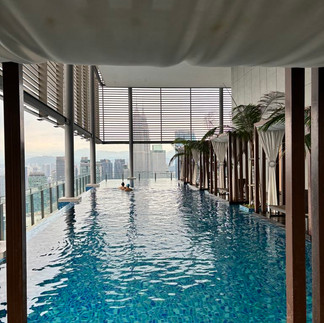Wall Street to Nomad: (Mini) Retired @ 30 - Most Frequently Asked Questions
- Trekking for Alpha

- Jun 11
- 9 min read
Welcome to our new series Wall Street to Nomad: (Mini) Retired @ 30. In this series, we will explore topics like why we decided to travel full time, benefits of traveling in this way, logistics and challenges on the road, travel advice including top destinations to date, etc. The following post, our first in this series, provides answers to our most frequently asked questions regarding our journey.
How much did you spend during your first year?
Our goal was to spend equivalent to what we spent on NYC rent – $3,500 per month per person or $42,000 for the year. Without sacrificing experience, comfort, or efficiency and without fixating on this number, we spent just about that or maybe even slightly less. This amount includes all expenses including U.S. healthcare premiums.
Honesty, our lifestyle on the road is pretty nice. We live more luxuriously than we did in NYC. By traveling to more off-the-beaten-path places, we are able to afford an incredible existence for a lot less….lets just say places like Iraq, Kyrgyzstan, and Armenia are not that expensive. We often stay in luxury Airbnbs, go to high end restaurants, and take Ubers vs. public transit. That being said, you could do this sort of travel a bit cheaper (and obviously a lot more luxuriously, but that would take some of the fun out of it). We seek balance in how we spend during our travels - some places have more expensive transport, some have expensive housing, some have expensive experiences - we adjust in each place to make it work.
Our view is that this is a once-in-a-lifetime experience and that most countries provide great value for the quality so we might as well take full advantage.
Total Daily Cost: ~$100 / day per person – some days go over by a bit and some days are under by a bit… it averages out
Hotels: $40-$50 / night
Food: $15 / day per person… we will do a few splurge days in each country to experience the higher-end restaurants
How long do you stay out of the U.S. at one time?
We stay out for two to six months. When we are leaving the country we always buy a one-way ticket and never know how long we will be gone or exactly where we will go. When we do come back to the U.S., it's always for one of two reasons: attending an important life event with family or friends OR to pivot regions (i.e., leaving South America to head to the Middle East).
The first time we left, we were gone for five months. We snaked our way through Asia from Kathmandu to Ulaanbaatar and came back for a wedding. The second time we left, we were gone for six months. We bought a one-way ticket to Antananarivo, Madagascar, then went to the Caucuses, Northern Europe, and the Middle East. Then, in the middle of all of this, we took a 10-week job which involved strengthening private markets in conflict-affected states in Africa – think investment banking work in super challenged markets. We came back for the holidays and to change regions out of Africa. Recently, we have taken a few shorter trips to South America. A few weeks ago, we bought a one way ticket to Beirut and have been floating around the Middle East. We have no idea how long we will be gone for.
The longer you stay out at one time, the better bang for your buck the travel is. Regional transport, even flights, is often really inexpensive so if you are out for a long time you can see a lot for pretty cheap. However, you can tailor this to what works for you. If you need to come back to the U.S. more, that’s fine, it's just more expensive and time intensive.
What does your family think of this?
We have no other siblings so from our parents’ perspective, both their daughters just up and left stable jobs and safety in America to globe trot. But… luckily our parents are VERY supportive. They understand that this journey is important to us and wouldn’t want us living with regret over not having done this. They trust that we are learning and growing on the road (they learn a lot from our stories too!) and know that we will work good jobs again one day. They prioritize our happiness and know this makes us happy. This trip is also fully self-funded so they are not financially involved at all.
They do sometimes stress about security although they know the risks we take are calculated…
Inside the incomplete Grand Mosque in Mosul, Iraq (started by Saddam Hussein), Khyber Pass, Hezbollah propaganda in Bekaa Valley Lebanon
When is the right time to travel long term?
While many people consider doing a gap year of sorts right after college, we think there are advantages to embarking on this journey after having worked for a few years. First off, it’s important to have reasonable savings before traveling full time. Savings are important here for a few reasons. Having a larger budget allows you to go to more remote places / experience more and also allows you to have less stress about money along the way. Additionally, your savings can continue to generate returns for you while you’re on the road. Our savings are either invested and (hopefully) generating returns for us or at the least generating interest.
Second, you acquire skills at work which you can use along the way or incorporate into your travels. For example, we have been meeting with investors in off-the-beaten-path markets which has been really additive to our experience and has allowed us to build an interesting, vast network around the world. Third, acquiring skills / experience working prior to setting out gives you more confidence to re-enter the workforce when the time comes. Finally, doing a trip like this prior to retirement while you are younger and can physically bounce back quickly allows you to take more risks and experience more - you can be more comfortable going to further off the grid places (with few to no quality healthcare facilities) and you can do more strenuous physical activity.
Do you still have an apartment?
No. We got rid of our apartments in NYC. Our belongings are stored in Texas at our parents’ house. We went full nomad.
Where have you been so far?
On World Tour we have been to 38 countries including (listed in chronological order):
Nepal, India, Sri Lanka, Malaysia, Indonesia, South Korea, China, Mongolia, UAE, Madagascar, Azerbaijan, Georgia, Armenia, Finland, Sweden, Estonia, Latvia, Lithuania, Poland, Oman, Sierra Leone, Kenya, Ethiopia, Brazil, Iraq, Pakistan, India (x2!), Japan, China (x2!), Vietnam, Thailand, Chile, Argentina, Uruguay, Paraguay, Panama, Ecuador, Lebanon, Jordan, Turkey… Heading to Tajikistan, Turkmenistan, and more!
We try to get regional and cultural diversity. Overall, we’ve both been to over 80 countries total. We don’t travel with country count in mind.
Sierra Leone, Azerbaijan, Istiqlal Mosque in Jakarta
How do you pick where to go?
We have many bucket list items which we use as guideposts and let opportunistic flight prices and curiosity dictate the route.
For example, on our first stretch, we knew we wanted to go to i) Nepal, ii) India, iii) Indonesia, and iv) Mongolia with the bucket list travel items being Everest Base Camp trek, Rajasthan, snorkeling in Indonesia, and seeing the nomads throughout the Mongol steppe. We ended up visiting many other places en route to these countries. We found cheap flights from India to Sri Lanka then Sri Lanka to Malaysia then Malaysia to Indonesia - we followed this path. From there, we had to trace backwards to get to Mongolia as its capital is a pretty expensive place to fly to. We saw cheap flights through Beijing to Mongolia and found a cheap route to Beijing via Seoul from Jakarta. Sometimes, our routes are even less structured than this. We will at times select our next destination based on wherever is cheapest (sometimes we hop on a flight or see new countries by ferry or bus too). Of course, these side destinations are still on the way to a bigger, bucket list stop. This strategy has pushed us to places we never really considered which has been great as some are true gems.
Travel highlights will be featured in a future post...
How do you pack for a trip like this?
While on the road, we do an incredibly broad range of activities in different climates and in different cultural contexts. From attending formal events with heads of state to spending time in extremely conservative Islamic regions to snorkeling in the tropics to hiking through snow storms to meetings with investors, we have had to fit a lot of clothes for a lot of occasions into a backpack and carry-on.
We take only a rolling carry-on bag (much better than a large backpack or checked rolling bag, etc.) and a normal sized backpack. We pack purely for practicality and convenience. We bring clothes that are versatile i.e., scarves/pants which can be worn in both more conservative Islamic societies and in colder weather. We have clothes that can be dressed up or down, that can be layered in different climates, etc. Everything we pack is lightweight – jeans and corduroy are out! We also only bring three pairs of shoes – sneakers, Teva sandals, and black leather loafers for formal events. Our clothes are also dark in color and made of basic materials so they can be washed easily as needed.
With respect to helpful gear, we always bring a headlamp, gaiter, gloves, hat, lightweight towel, and lightweight day pack. We also travel with malaria and altitude medications, Z-Paks, and a lot of sunscreen.
Crossing the Pakistan / India border with all of our stuff
How do you go from a 70-hour per week job to this?
We spend a lot of time learning. Before we go somewhere new, we spend hours reading about the economy, history, politics, and culture. One thing that is great about long term travel is you have the time and headspace to do this sort of research.
It is also a lot of work planning back-to-back trips. Many of the trips we have done - W Trek in Chile, snorkeling in Komodo, Borneo orangutans, Madagascar, Mongolia, Everest Base Camp - are typically planned months out so planning everything so consecutively and last minute takes up a lot of energy.
Finally, we have been meeting with investors, business leaders, and economists along the way which has allowed us to keep our heads in the game. In order to stay sane, we think a side passion project is important on a journey like this. Find something you are interested in exploring but that will not overshadow the experience or create too many restrictions / stress.
Working in a yurt, on a boat in Indonesia, and at a lodge in the Amazon Rainforest
How do you think about housing?
The fatigue of long-term travel in conjunction with not having a permanent place to call home often makes us feel unstable. Staying in apartments really helps us cope with this. If we are staying somewhere for over two nights, we try to book an Airbnb. Staying in an apartment gives us more room and access to washing machines and kitchens which helps us reset. It is also often the same price or cheaper than a hotel. We prioritize hotels in certain instances - when safety is an issue or we need luggage storage and no apartments in the area have this.
We take advantage of the comforts of cities so that we have the energy to manage the varying conditions we face on more intense stretches of travel. At times we go to extremely remote regions where housing options are limited. We have slept in yurts, huts, tents, boats, barns, shacks... It can get exhausting, but it is always worth it.
We rarely stay in hostels. We did once in Scandinavia, but that's it. Since there are two of us and we are often in cheaper countries, it rarely makes fiscal sense to stay in a hostel. Additionally, we are also often in places where hostel culture isn't really a thing.
Booking Apps: With respect to apps, we use everything – Google, Airbnb, Booking, Agoda, Priceline, Expedia, etc. – and compare deals. We use Booking most frequently as their rewards program can help us get very good rates. We also use Airbnb frequently. We often book same day and can snag some pretty good last minute deals because of this.
Barn "homestay" in Mongolia, apartment in Kuala Lumpur, petting zoo at hotel in Freetown, Sierra Leone
Do many people question your choice to do this? How do you handle that?
Of course! We run into a lot of people who imply that this journey is career-ruining, irresponsible, and / or a waste of time. We can even tell that some of our close friends think in this camp. While on the road, we have met a lot of international investors / business leaders who say we are crazy for leaving NYC finance jobs.
In the veryyyy beginning of our trip, this questioning used to bother us a bit more. However, as the year has progressed and we have learned more and more and we have pushed ourselves in so many unique ways, we have seen how powerful and differentiating an experience like this can be. We have self-conviction that this is a very additive experience in the course of our life (and career). If others do not see the value, that is their problem. Doing something unconventional like this really forces you to have conviction in yourself. This will test you to swim against the current and take a bet on yourself which we think in and of itself is an important learning experience.












































Comments